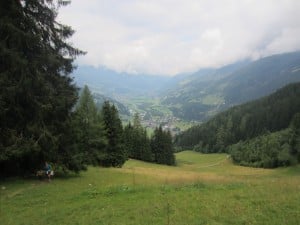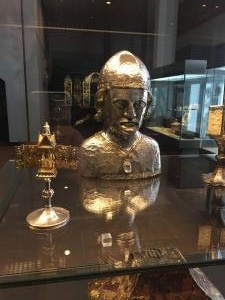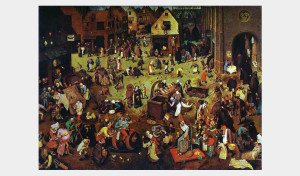Germany has apparently decided to postpone its ill-conceived plans to exhibit the hundreds of works of art that it still holds from the trove seized from the late Cornelius Gurlitt. This decision was announced as a date was set to hear the latest stage of the challenge brought by Gurlitt’s cousin Uta Werner to the will that Gurlitt wrote in the last weeks of his life, leaving the entire collection to the Kunstmuseum Bern. As the Gurlitt fiasco trudges through its fourth year, this move is emblematic of the too little too late approach that has characterized the entire affair.
Potemkin Village Deferred—Planned Exhibition of Gurlitt Trove is Postponed
Topics: Schwabinger Kunstfund, Nazi-looted art, Gurlitt, Restitution, World War II, Task Force, Kunstmuseum Bern, Monika Grütters, Raubkunst
HEAR Act Introduced by Sen. Ted Cruz to Create Federal Standard for Holocaust Art Claims
Among the many challenges that litigants over Nazi-looted art face in the United States is a lack of uniformity. Statutes of limitations vary from jurisdiction to jurisdiction, and interpretations of jurisdictional laws like the Foreign Sovereign Immunities Act differ from one Court of Appeals to another. This is particularly challenging in the context of the Washington Conference on Nazi Looted Art of 1998 because private disputes are where the issue has meaning in the United States. There is no national commission to address potentially looted art in public possession like those in Austria, Germany, or the Netherlands (however well or poorly some of those commissions perform) because there is very little art in national ownership about which the federal government has any power to decide. Thus, in assessing U.S. compliance with the Washington Principles, it is often left to private litigants to argue about what the Principles mean in individual disputes. Happily, appellate courts have begun to reject consistently the denialist defenses of foreign countries that wish to keep stolen art just because they say so, holding that the Washington Principles support the ability of heirs to pursue claims. Yet the uneven landscape is still daunting.
A new bill introduced this week would address that, though its chances of passage into law in a contentious election season are hard to be optimistic about.
Topics: Legislation, Nazi-looted art, Restitution, World War II, Charles Schumer, John Cornyn, Holocaust Expropriated Art Recovery Act, Richard Blumenthal, HEAR Act, Ted Cruz
Germany Relents on Nazi-Looted Art Advisory Commission Jewish Membership
Barely a week ago German Minister of Culture Monika Grütters was dismissively rejecting any changes to the Advisory Commission that issues recommendations on claims of Nazi-looted art in German museums. Today, in a classic Friday afternoon news dump, Germany caved to a drumbeat of pressure to include Jewish members of the Commission, pressure that began right here and continued with the support of colleagues and friends around the world. The lesson? No voice is too small to make a difference.
Topics: Germany, Nazi-looted art, Restitution, World War II, Monika Grütters, Raubkunst, Limbach Commission
Germany Keeps Digging—Explanation for Excluding Jewish Member from Nazi-looted Art Advisory Commission is Worse than Before
Last week Germany’s Minister of Culture Monika Grütters made the astonishing statement that the Advisory Commission that issues recommendations for questions of allegedly Nazi-looted art in German museums would not be revised to include a member of the Jewish community because that Jewish member “would be the only voice who would be prejudiced.” The statement was not idle gossip, it was to the New York Times, which was writing a feature piece about her. This was a shockingly tone-deaf statement for a German cabinet member to make. Even in a vacuum, it is logically indefensible; why would a Jewish member be more biased than a German member (about which she had no objection). And, of course, it is not a vacuum—we are talking about Germany.
Topics: Germany, Nazi-looted art, Gurlitt Collection, Advisory Commission, Restitution, Monika Grütters, Raubkunst, Limbach Commission
Live from the Oscars! German Cultural Ministry Disparages Possible Inclusion of Jewish Member on Advisory Commission
Topics: Ronald S. Lauder, Gurlitt Task Force, Germany, Nazi-looted art, Gurlitt, Restitution, Monika Grütters, Raubkunst, Limbach Commission
Time to Go—Flechtheim Heirs Withdraw from Limbach Commission That Has Outlived its Usefulness
Two days after suspending their participation in the Advisory Commission on the return of cultural property seized as a result of Nazi persecution, especially Jewish property, often called the "Limbach Commission" after its presiding member Jutta Limbach (the Beratende Kommission im Zusammenhang mit der Rückgabe NS-verfolgungsbedingt entzogenen Kulturguts, insbesondere aus jüdischem Besitz), the heirs of Alfred Flechtheim withdrew from the proceedings entirely. The dispute concerns Violon et encrier (Violin and Inkwell) (1913) by Juan Gris in the Stiftung Kunstsammlung Nordrhein-Westfalen (Art Collections Foundation of North Rhine-Westphalia) in Düsseldorf.
Topics: Alfred Flechtheim, Nazi-looted art, Advisory Commission, Beratende Kommission, Restitution, Düsseldorf, World War II, Limbach Commission, Dr. Michael Hulton, Juan Gris
Gurlitt Task Force Issues Fifth Recommendation for Restitution
Sophisticated Analysis of Adolph von Menzel Drawing Distinguishes Itself from Recent Revisionism Elsewhere
As the original term of the Gurlitt Task Force (Taskforce Schwabinger Kunstfund) winds down, the panel has issued a report on a work that it deems appropriate for restitution: Interior of a Gothic Church (Inneres einer gottischen Kirche) by Adolph von Menzel (pencil drawing, signed/dated 1874). The drawing has been called Church in Hofgastein in some English language articles.
Topics: Interior of a Gothic Church, Hildebrand Gurlitt, Cornelius Gurlitt, Nazi Germany, Inneres einer gottischen Kirche, Dresden, Gurlitt Task Force, Adolph von Menzel, Nazi-looted art, Gurlitt Collection, Ernst Julius Wolffson, Washington Principles on Nazi-Looted Art, Advisory Commission, Munich, Albert Martin Wolffson, Salzburg, Restitution, Catrin Lorch, Bavaria, World War II, Switzerland, Süddeutsche Zeitung, Austria, Kunstmuseum Bern, Federal Republic of Germany, Raubkunst, Taskforce Schwabinger Kunstfund, Elsa Helene Cohen, Limbach Commission, Jörg Häntzschel
Widespread Criticism Continues from Historians Over Germany’s and SPK’s Revisionism Concerning Holocaust and Forced Sales of Art
We reported last week on the outrage over the decision by Germany and the Stiftung Preussischer Kulturbesitz (SPK) to argue in their motion to dismiss my clients’ claims to the Welfenschatz that a commercial interaction between German Jews and a cabal instigated by Hermann Goering in 1935 “predated the Holocaust by several years.” As we noted last week, the suggestion that the Holocaust was a distant possibility in 1935 was an indefensible statement, factually, historically, and ethically. The initial reaction was swift and severe. As Germany gets ready to host the First Conference of the German Centre for Cultural Property Losses next week, its policies are hurtling in the wrong direction.
Topics: Jewish Week Mel Urbach, Hermann Goering First Conference of the German Cen, Gesetz zur Wiederherstellung des Berufsbeamtentums, Henning Kahmann, Atlanta, Simon Wiesenthal Center, Varda Neumann Federal Administrative Court, Yale University, Marion Kaplan, New York University, Germany, Nazi-looted art, Hitler, Kristallnacht Rabbi Abraham Cooper, Deborah Lipstadt, U.S. Holocaust Memorial Museum, Markus Stoetzel, Emory University, Behrens, Holocaust, Bloodlands, SPK, Advisory Commission, Black Earth: The Holocaust as History and Warning, Stiftung Preussischer Kulturbesitz, Restitution, Los Angeles, World War II, Law for the Restoration of the Professional Civil, Washington, Raubkunst, Timothy Snyder, Welfenschatz
Bruegel Painting In Vienna Spurs Argument Over Allegations of Nazi Looting in Poland
Most often in restitution battles the disagreement boils down to whether a painting was looted, and/or whether it changed hands under circumstances that failed to pass clear title to the predecessor of its current possessor. Then, controversy frequently ensues about the extent to which the possessor resists restitution on grounds other than the title of the painting (jurisdiction, statute of limitations, etc.). Rarer is the type of dispute where the parties don’t even agree about what they’re disagreeing about, like the one brewing between Austria and Poland over a painting by Pieter Bruegel the Elder that hangs in the Kunsthistorisches Museum (KHM) in Vienna, The Fight Between Carnival and Lent (1559).
Topics: Musée des Beaux Arts, Brussels, Krakow, Nazi-looted art, Diana Blonska, Gauleiter, Otto Gustav von Wächter, Feliks Kopera, Charlotte Wächter (née Bleckmann), Restitution, Kampf gegen Fasching und Fasten, Frau Wächter, Pieter Bruegel the Elder, Kunsthistorisches Museum, Poland, Austria, Museums, Vienna, The Battle Between Carnival and Lent
Gurlitt Collection May be Displayed Next Year, Real Progress Still Elusive as Focus Remains on Public Relations
After months of relative inactivity, there was news this week in the saga of Cornelius Gurlitt, the reclusive German man from whose apartments in Munich and Salzburg more than 1,280 objects were seized as part of a tax investigation, objects that came under suspicion of Nazi looting because of the privileged position held by his father Hildebrand Gurlitt. Unfortunately, the latest news continues a string of public relations efforts that bespeak no real progress as we approach the second anniversary of the public awareness of the story. Quite unlike the plaudits that were thrown around by many last year (though not by us) concerning Germany’s agreement with Gurlitt’s named heir, the reaction has been appropriately skeptical this time.
Topics: cultural property, Sepp Dürr, Schwabinger Kunstfund, Hildebrand Gurlitt, Art Hall of the Federal Republic of Germany, Cornelius Gurlitt, Bonn Minister of Culture, Nazi-looted art, Gurlitt Collection, Entartete Kunst, Munich, World Jewish Congress, Salzburg, Restitution, Müncher Kunstfund, Der Spiegel, World War II, Task Force, Kunstmuseum Bern, Museums, Monika Grütters, Raubkunst, Green Party, Kunsthalle der Bundesrepublik Deutschland, Ronald Lauder






